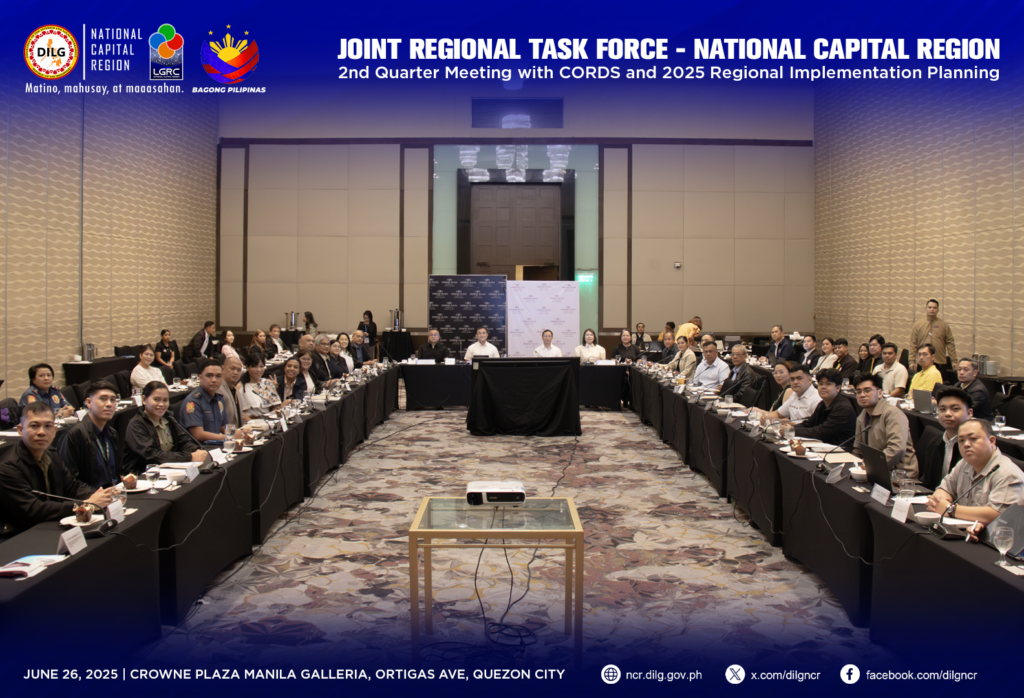
In line with Executive Order No. 70, Series of 2018, and the government’s ongoing commitment to fostering peace, unity, and development through the Whole-of-Nation Approach,the Joint Regional Task Force–National Capital Region (JRTF-NCR) recently held its 2nd Quarter Meeting with the Cabinet Officer for Regional Development and Security (CORDS) and Regional Implementation Planning for 2025-2028.
The activity brought together Cluster Leads and Agency Members of JRTF-NCR, along with key representatives from the Department of the Interior and Local Government (DILG) Central Office and the National Task Force to End Local Communist Armed Conflict (NTF-ELCAC).
DILG Undersecretary for Local Government Marlo L. Iringan delivered the welcome message on behalf of DILG Secretary Juanito Victor C. Remulla as the CORDS for NCR. In his message, CORDS for NCR reaffirmed the Department’s commitment to unified peace efforts. He emphasized that the CORDS meeting is a vital component in giving policy direction and ensures that national priorities are reflected in regional strategies. Meanwhile, Undersecretary Ernesto C. Torres Jr., Executive Director of the NTF-ELCAC highlighted NCR’s strategic significance in the government’s campaign against Communist Terrorist Groups (CTGs). He noted how the NTF-ELCAC has closely monitored the emergence of ideological initiatives, especially among younger individuals.
In the message of JRTF-NCR Head Secretariat and DILG-NCR Regional Director Maria Lourdes L. Agustin, CESO III, she mentioned how using the forum as a space for ideas is welcomed to harness and shape goals:
“Gatherings like this remind us that planning is not merely a technical exercise as it is a human process. The journey from 2025 to 2028 is a critical window for us to scale up our efforts, bridge policy and practice, and drive real transformation on the ground. Today, we are seeing it in action,” Regional Director Agustin mentioned.
As part of the planning process, the task force together with other key officials from the NTF-ELCAC, evaluated the relevance and effectiveness of ongoing initiatives, identified emerging security challenges across Metro Manila, and reinforced the need for inter-agency cooperation under the Whole-of-Nation Approach, aligned with the outcome objectives of the National Action Plan for Unity, Peace and Development or NAP-UPD for 2025-2028. Another major objective was the development of cluster-specific operational plans tailored to localized peacebuilding efforts.
A presentation of accomplishments from 2022 to 2024 followed, showcasing the significant achievements of JRTF-NCR’s 12 clusters. Central to this report was the implementation of the Capacitating Urban Communities for Peace and Development (CUCPD) program, a flagship initiative under DILG’s peacebuilding strategy. The Secretariat also shared highlights of the 2024 achievements and outlined proposed directions for 2025.
The session also featured updates on key guidelines and frameworks. This included the presentation of the enhanced CUCPD Guidelines and an overview of the NAP-UPD 2025–2028. The updated framework emphasizes three core outcomes: Unity, Peace and Security, and Socio-Economic Development underscoring the government’s holistic approach to addressing the roots of conflict and fostering sustainable peace in urban communities.
A collaborative workshop focused on formulating the 2025–2026 Regional Implementation Plan. This session also provided a platform for the various clusters to raise operational concerns, particularly in aligning their efforts with the sub-outcomes of the NAP-UPD. Key points highlighted during the workshop included the need for clarity on the current status and target-setting in submitting comprehensive implementation plans. Participants also emphasized the necessity of responsive programming, especially initiatives that address the needs of youth, women, and other vulnerable sectors.
In the closing message of DILG-NCR Assistant Regional Director Atty. Ana Lyn R. Baltazar-Cortez, CESO IV, she reiterated how providing direct feedback directly impacts policy creation:
“What we have witnessed today is a truly participatory process where a collective vision was shaped. This is the kind of collaboration that strengthens our planning processes and reinforces the essence of inclusive governance. The insightful feedback and honest discussions have shown how much we all care, not just about compliance with policies, but about making sure these plans will truly serve our communities on the ground,” Assistant Regional Director Baltazar-Cortez mentioned.
The session culminated with preparations for the Regional Implementation Plan, which will be submitted for endorsement by the Cabinet Officer for Regional Development and Security (CORDS) for NCR. The finalized Regional Implementation Plans will be submitted to the CORDS for NCR for strategic guidance and formal endorsement. These plans will serve as operational blueprints to ensure that JRTF-NCR’s initiatives remain aligned, inclusive, and impactful in sustaining peace and development in the National Capital Region.
As the Joint Regional Task Force–NCR moves forward with renewed purpose, this strategic planning and alignment workshop marks a critical step in ensuring that peacebuilding efforts are not only coordinated but also responsive to the evolving needs of Metro Manila’s communities. Through shared commitment, open dialogue, and collaborative action, JRTF-NCR and its partner agencies reaffirm their dedication to the Whole-of-Nation Approach, forging a path toward lasting peace, inclusive development, and resilient urban communities under the 2025–2028 National Action Plan for Unity, Peace, and Development.
